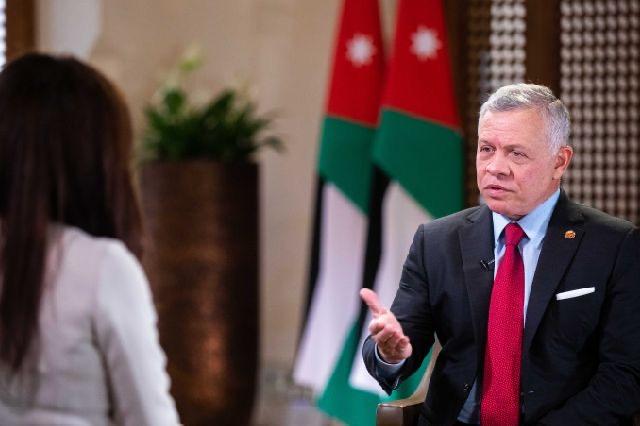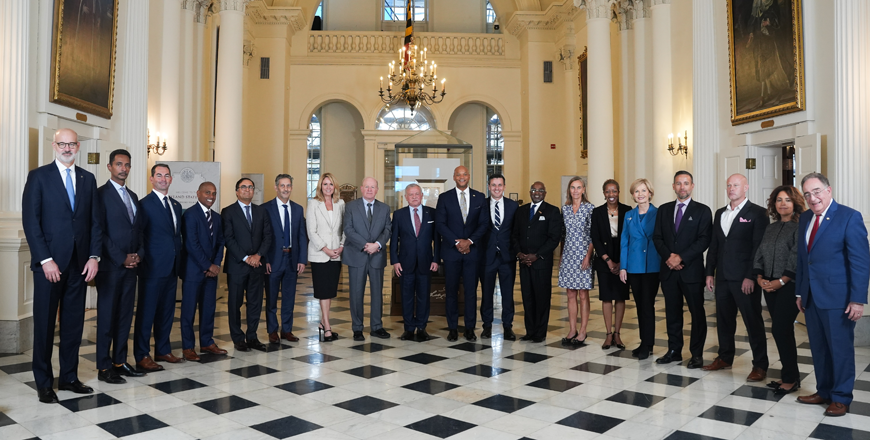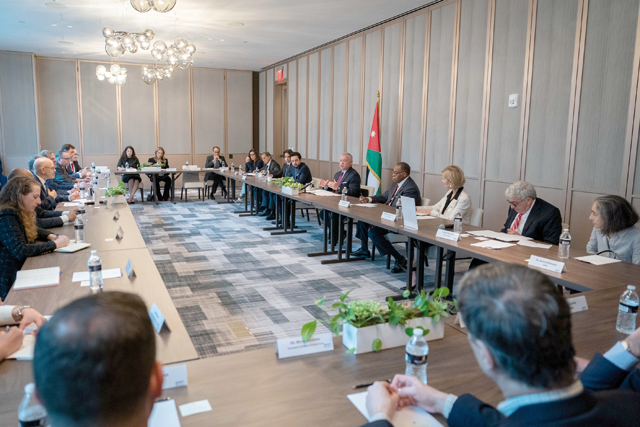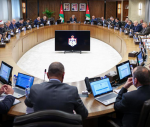You are here
King to CNBC: Regional projects are the buzzword of the future
Jul 08,2022 - Last updated at Jul 08,2022

Amman — CNBC on Friday published its interview with His Majesty King Abdullah, conducted recently by Anchor and Senior International Correspondent Hadley Gamble.
In the interview, King Abdullah spoke about Jordan’s Economic Modernisation Vision for the next decade, which seeks to sustain recovery from the impact of the COVID pandemic while planning for the upcoming years by capitalising on opportunities in the Kingdom, especially amid the impact of the Ukrainian crisis.
His Majesty discussed a number of regional and international issues, as well as their effects on Jordan and the region. Responding to a question on the need for “a NATO for the Middle East”, the King said the issue of alliances is complicated if their charter and mission statement are not identified, stressing the need to consider linkages to the rest of the world, and to find a suitable formula for a very clear mission, otherwise, the alliance would confuse everybody.
Commenting on Jordan’s economic vision, His Majesty said there is a need to work further on enhancing the private sector’s capacity to provide job opportunities, by capitalising on Jordan’s competitive investment advantages.
“Geographically, where Jordan is located, we have always been a hub; we have always been the back office for the Gulf countries. I think we can actually promote ourselves to be the front office on many issues,” the King noted.
His Majesty highlighted stability as part of Jordan’s strength over the past decades, in addition to its ability to overcome the COVID pandemic and to deal with the challenges of food security and regional instability.
“When you look historically at Jordan, investors have all been very comfortable about stability, and I think that has been one of our number one cards that we have been able to play,” the King continued.
Discussing Jordan’s modernisation efforts, His Majesty reiterated the importance for proceeding with them in parallel across the political, economic and administrative tracks, as none can be achieved without the other.
The King said administrative reform is the more long-term, challenging aspect, noting that countries all over the world have to deal with it, yet Jordan’s goals cannot be achieved without administrative reform, which is also key in the fight against corruption.
Turning to political modernisation, His Majesty spoke about the need to enhance public trust in political parties, and encourage the engagement of youth in partisan life, stressing the role of young people in advancing democracy in Jordan, and highlighting the importance of responsible freedom of expression.
Responding to a question on the impact of the crisis in Ukraine on the region, the King underlined its repercussions on food security, noting that this challenge emerged with the pandemic and is now being exacerbated with this crisis, which has also affected the prices of basic commodities.
On food security, His Majesty said Jordan has stocks of wheat and barley for nearly 15 months, which enhances the Kingdom’s resilience, stressing the need for countries in the region to cooperate and enhance resilience to deal with the long-term requirements for food security.
The King spoke about the importance of creating a new vision for the region that entails moving away from politics and looking at economic opportunities to break down barriers.
“Regional projects, I think, are the buzzword of the future… It brings us all, countries with different backgrounds, to be able to build this new, hopefully sustainable vision for the peoples of the region” to ensure job creation and a better life, His Majesty said.
From a geographic aspect, the King said Jordan is front and centre to many regional projects, citing Jordan’s stability and resilience as key factors that serve all stakeholders in the region.
Acknowledging the challenges of energy, water and refugees that Jordan is facing, His Majesty said there are also opportunities for the Kingdom to become a hub for alternative energy and agriculture, and to work with regional partners on enhancing their food security.
The King said regional projects offer opportunities for everyone, but if one country is suffering, these regional projects will be affected, adding that he looks forward to seeing a new approach of enhanced partnership in the region, with the possibility of including all stakeholders.
Responding to a question on the role of Iran, His Majesty pointed to regional projects and said Tehran could wonder about its part in this type of cooperation, “and so can we put political differences aside to do something right for the peoples of the region?”
“We are looking forward to President [Joe] Biden's visit to the region and I think the outcome of that is how can we accelerate these regional projects that break down political barriers,” the King said, adding that one of the messages that the US president will bring to the region is “count on the West, count on Europe and the United States, because we are going to be actively engaged.”
Discussing regional challenges, His Majesty reaffirmed the centrality of the Palestinian cause, and that the two-state solution is the only solution, warning that the absence of dialogue between the two sides creates insecurities and instability in the region, which, in turn, will affect regional projects.
Moving forward in resolving the Palestinian-Israeli conflict cannot take place without the US umbrella, the King continued, noting that at the same time, there is much work that countries in the region need to do, as well as the Palestinians and the Israelis, before the US comes in to make a difference “and it is a presidential card that always takes us across the finish line”.
In the interview, His Majesty also spoke about the regional implications of the Ukrainian crisis, especially in terms of decreasing the Russian presence in Syria, after having served as a de-escalation factor on the borders with Jordan, and now, the Kingdom is facing the threats of militias on its border, and attempts to smuggle drugs and weapons, in addition to the rising threat of Daesh.
Asked about the Russian president, whom he has known for over two decades, the King said President Vladimir Putin believes in the greatness of Russia, and is surrounded by a strong team.
“At the end of the day, we had all hoped that the crisis would not happen. It is what it is now. We are dealing with this issue, and the longer it goes on, nobody wins,” His Majesty continued, warning that the implications of the crisis will not be limited to Europe, but will extend to the entire world.
“So how do we give each other respect and how do we give each other an opportunity to find an exit? ... Where is that opportunity where the olive branch can be extended in mutual respect so that we can start moving back towards the light?” the King asked.
Related Articles
AMMAN — His Majesty King Abdullah gave an interview to CNBC Anchor and Senior International Correspondent Hadley Gamble.In the interview, fr
AMMAN — His Majesty King Abdullah on Wednesday met with a number of CEOs and representatives of US companies and universities in Annapolis,
AMMAN — His Majesty King Abdullah on Monday met with CEOs and representatives of major US and international companies in New York, with disc



















